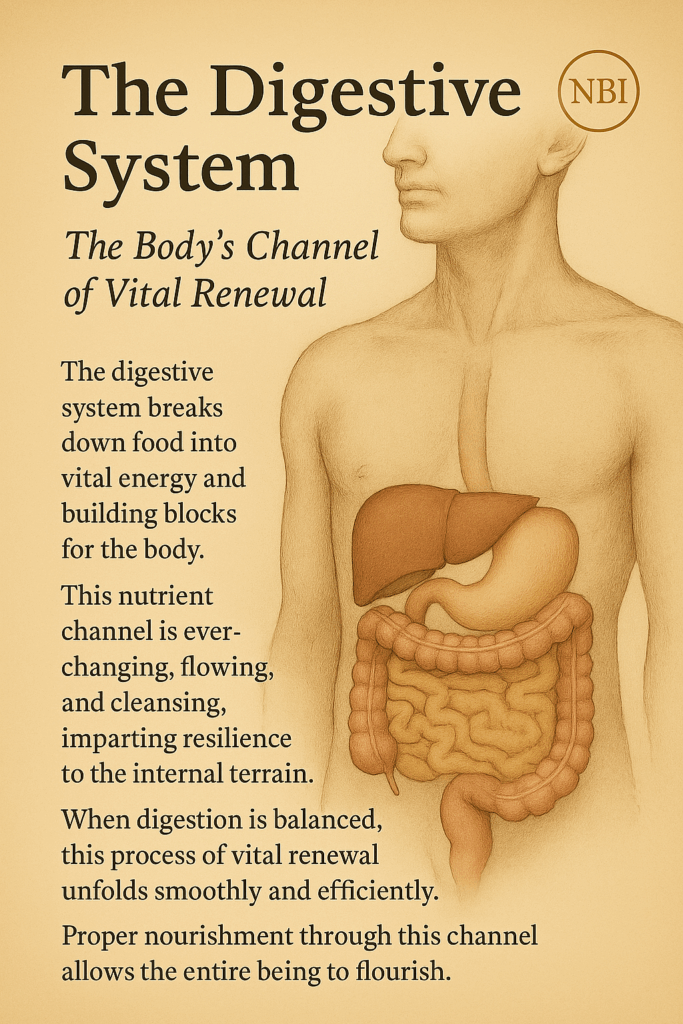The digestive system is one of the body’s most hardworking networks. Its role is simple: take in food, break it down, absorb what is usable, and eliminate what is not. Yet in the modern world, digestion has become one of the most overburdened and misunderstood processes. Natural Hygiene teaches that digestion should be effortless. When the body is given the foods it is biologically designed for, the digestive system functions smoothly and quietly, without discomfort or strain. It is only when we interfere with natural eating rhythms, food choices, and emotional state that digestion becomes difficult.
The digestive system includes the mouth, stomach, pancreas, liver, gallbladder, small intestine, large intestine, and the network of nerves and hormones coordinating it all. Each part has a precise role. When living conditions are harmonious, these actions take place with ease. But when we overload the body with heavy foods, poor combinations, overeating, stimulants, and stress, the digestive system must work far beyond its natural design.
Digestion Begins Before Eating
Natural Hygiene recognises that digestion starts with the senses. Smelling, seeing, and anticipating food triggers saliva, stomach acid, and digestive juices. When a person eats while stressed, distracted, rushing, or emotionally unsettled, the body cannot begin digestion properly. Stress hormones block normal digestive secretions, meaning food enters the stomach without the preparation it needs.
Eating mindfully, in a calm environment, allows the body to initiate digestion smoothly. This small shift alone can transform a person’s digestive experience.
The Stomach and the Importance of Simplicity
The stomach’s job is to break down food into a semi-liquid mixture. It is not designed to handle very large meals or overly complex combinations. Natural Hygiene has long taught that mixing too many different types of food — especially proteins, fats, and starches together — makes digestion slow and cumbersome.
When meals are kept simple, especially when based on fruits and salads, the stomach’s workload is light. Natural foods break down easily because they contain water, fibre, natural enzymes, and the perfect balance of nutrients. Heavy meals of cooked fats, animal foods, bread, oils, processed starches, sweets, or combinations of all of these create fermentation, gas, acid reflux, and bloating.
Symptoms arise not because the stomach is “weak”, but because it is being asked to perform a task outside its natural capacity.
The Small Intestine: Where Absorption Truly Happens
Most digestion occurs in the small intestine, where nutrients are absorbed into the bloodstream. Its inner surface is lined with tiny projections called villi, which increase the area available for absorption. For these structures to work well, the intestinal environment must remain clean and free-flowing.
Natural foods support this beautifully. Fruits, vegetables, and leafy greens pass through quickly and leave behind minimal residue. Heavy foods, especially those containing cooked fats and refined starches, leave behind mucus-like coatings that slow absorption and burden the intestinal lining.
When the small intestine becomes congested, the whole body feels the consequences — fatigue, brain fog, inflammation, skin issues, and low energy. These are not separate problems but signs of digestive overload.
The Large Intestine: A Mirror of Lifestyle
The large intestine completes digestion by absorbing water and preparing waste for elimination. Natural Hygiene considers constipation one of the clearest signals of lifestyle imbalance. When people eat low-fibre, processed foods, or when they are dehydrated, under-rested, or emotionally tense, the large intestine becomes sluggish.
Fruit-rich diets, proper hydration, rest, movement, and emotional calm are the most effective ways to restore natural elimination. Herbs, laxatives, cleanses, and treatments are unnecessary when the cause is removed.
The Liver and Gallbladder: Responding to the Dietary Load
The liver is the chemical workshop of the body, processing nutrients and neutralising waste. The gallbladder stores bile, which emulsifies fats. Natural Hygiene emphasises that these organs were never designed to handle the modern diet: fried foods, oils, cheese, baked goods, processed fats, and constant snacking.
Every fatty or oily meal triggers a strong bile release. When this happens multiple times a day, the liver becomes fatigued. The body may produce discomfort, nausea, bitterness in the mouth, headaches, or a heavy feeling after eating. These symptoms are not “malfunctions”. They are simply feedback that the liver has been overworked.
Simplifying meals, reducing overt fats, and choosing water-rich foods allows the liver and gallbladder to operate lightly and naturally.
Emotional Influence on Digestion
The digestive system is profoundly affected by emotion. Stress redirects blood away from the digestive organs. Worry, anger, fear, or rushing can shut digestion down almost instantly. Many people believe they have food intolerances when in reality their digestion is being inhibited by their emotional state.
Natural Hygiene teaches emotional rest as a core part of digestive health. Calmness, breathing, simple living, and honesty with one’s feelings restore the nervous system and support natural digestive rhythms.
Fasting: The Ultimate Rest for Digestion
Few systems benefit from fasting as dramatically as the digestive system. Even a short fast gives the stomach, intestines, liver, pancreas, and gallbladder a complete break. When digestion is paused, the body redirects energy toward healing, cleansing, and repair.
People often notice improved clarity, lighter digestion, better elimination, and reduced discomfort after fasting. This happens because the digestive system finally has space to recover from years of overload.
Digestion Should Feel Effortless
The digestive system is not designed for pain, gas, heaviness, or discomfort. These sensations are simply the body communicating. When we return to natural foods, proper food combining, emotional calmness, rest, hydration, and simplicity, digestion becomes light and easy once more.
The body always moves toward healing when the cause of irritation is removed. Digestion is no exception.
How This System Communicates Stress
- Digestive discomfort
- Fatigue and exhaustion
- Pain, stiffness and inflammation
- Skin changes and surface elimination
- Emotional and nervous tension
Conditions Commonly Associated With the Digestive System
- Irritable bowel syndrome (IBS)
- Acid reflux / GERD
- Gastritis
- SIBO
- Leaky gut
- Constipation
- Chronic indigestion
- Colitis

